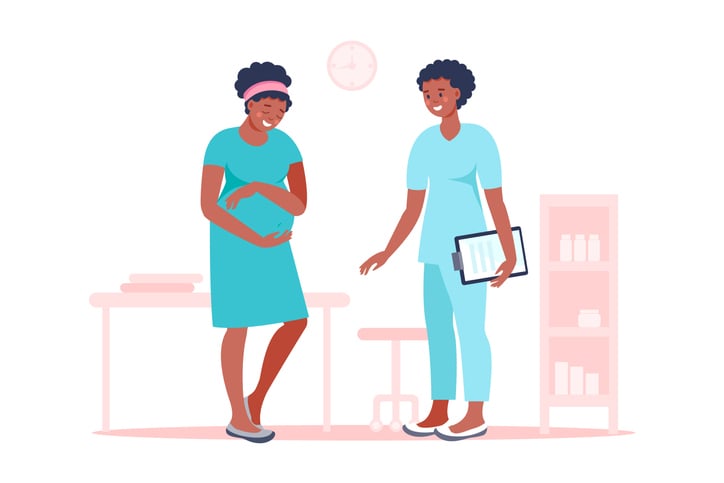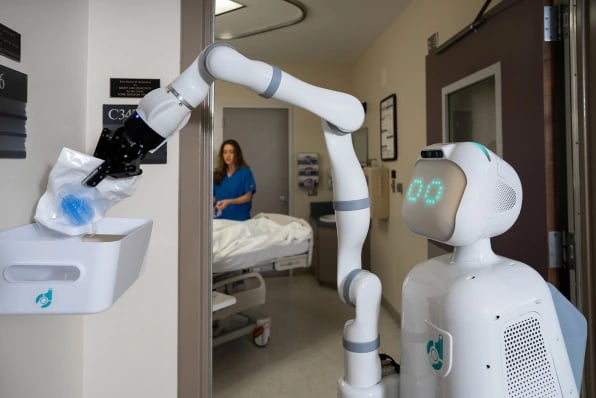 Certified Nurse Midwives (CNMs) are becoming more common for women and mothers across the nation.
Certified Nurse Midwives (CNMs) are becoming more common for women and mothers across the nation.
Overall employment of Nurse Midwives is projected to grow 45% from 2020 to 2030, much faster than the average for all occupations.
If you're interested in this career path, it's beneficial to understand what CNMs do and their role in health care.
Nurse Midwives are primary health care providers for women of all ages and provide all types of gynecological, prenatal, and post-pregnancy care.
According to Mayo Clinic College of Medicine and Science, common tasks and duties include:
- Confirming and dating pregnancy
- Providing prenatal and postpartum care
- Caring for women during childbirth including monitoring the mother and fetus during labor, assessing labor progress, managing complications, assisting with pain management, performing episiotomies if needed, and delivering the newborn and placenta
- Providing education for new parents on infant care
- Supporting new mothers that are breastfeeding with education and training
- Preparing pregnant women for what to expect during the birthing process
- Performing preventive health screenings and tests
- Diagnosing and treating gynecological disorders such as sexually transmitted diseases and infertility
There are many different paths in the Midwifery field. According to Western Governors University, various roles include:
-
CNM: Certified Nurse-Midwives are Registered Nurses who have additional certification as a Midwife. That double licensure gives them additional opportunity and training in the medical field. Specific Midwifery education is the same for a CNM and CM.
-
CM: A Certified Midwife is someone who is certified as a Midwife, but doesn’t have a Registered Nursing license as well. The certification is identical for a CM and CNM, the only difference is the Registered Nursing license.
-
CPM: A Certified Professional Midwife is certified and must have particular experience in home-birth or out-of-hospital settings. The certification requirements are much less than that of a CM or CNM. A Midwifery program may still be involved, but often it is less detailed and intense.
-
Doula: Doulas are not maternity care providers, but provide informational and emotional support for a mother during childbirth. Doulas provide services to mothers while they are pregnant, during their labor and delivery, as well as after the baby is born. Some Doulas work directly for birth centers or hospitals, while others are hired directly by expecting mothers. Because Doulas don’t provide medical support, there aren’t direct legal requirements regarding their practice. Some doulas get formal training, though it’s not required.
The average CNM salary in the United States is $116,574, as reported by Salary.com.
If you’re truly interested in becoming a Nurse Midwife, start with your BSN then find a Nursing school like Frontier Nursing University (FNU) to help get you started on your journey.
FNU graduates make up nearly 40% of the nation's Midwives!
At FNU, their goal is to educate more Certified Nurse-Midwives so that Midwifery care is available to all women who seek it.
"The passion in my life—besides my own babies—is being with women as they’re growing their families and being with students as they’re growing their dreams to be with women and families … It’s a privilege to get to do what I do. I do not take it for granted. I am thankful every day," says Tonya Nicholson, DNP, CNM, WHNP-BC, CNE, FACNM, FNU Faculty.


 Diversity, Equity, and Inclusion (DEI) in the workplace is beneficial for employers, staff, and patients. More hospitals and health systems are recognizing the importance and are rolling out new DEI programs.
Diversity, Equity, and Inclusion (DEI) in the workplace is beneficial for employers, staff, and patients. More hospitals and health systems are recognizing the importance and are rolling out new DEI programs.  While physical health is undoubtedly important, so is Mental Health. Millions of Americans are affected by mental illness each year. Psychiatric Nurses have the specialized knowledge and skills needed to treat these
While physical health is undoubtedly important, so is Mental Health. Millions of Americans are affected by mental illness each year. Psychiatric Nurses have the specialized knowledge and skills needed to treat these  Art therapy is a growing trend throughout hospitals in the United States.
Art therapy is a growing trend throughout hospitals in the United States. 
 Even before the pandemic, Nurses have suffered the effects of workplace stress and burnout. The Nursing shortage is a key factor when it comes to burnout. The lack of staff d
Even before the pandemic, Nurses have suffered the effects of workplace stress and burnout. The Nursing shortage is a key factor when it comes to burnout. The lack of staff d



 Why Should Healthcare Be Committed to Diversity in their Workforce?
Why Should Healthcare Be Committed to Diversity in their Workforce? 